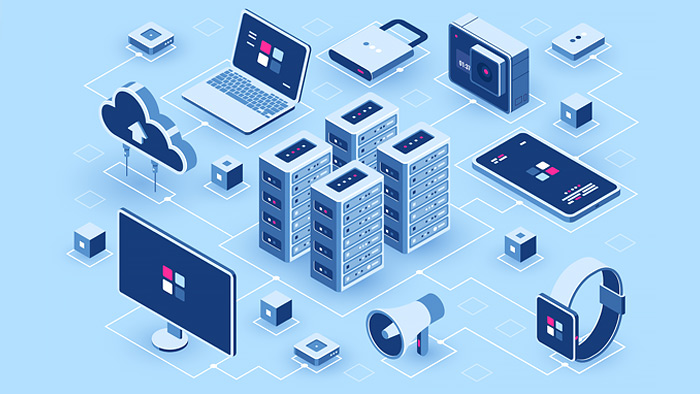Backing up data is essential for any IT system, whether it's personal or company data. If you have something on your computer or device that you can’t do without, then you should take steps to keep it secure.
While data loss may be upsetting or a nuisance for your personal data (losing photos and videos of important memories), for a business it can be irreversibly damaging.
On a small-scale data loss may simply affect an employee’s computer and they might lose a couple of day’s work. Irritating, yes, but not irreversible. However, on a large scale, your business could lose anything from client data to operational data, which could significantly hamper your ability to do routine business.
Not only can this affect the day-to-day workings of a business, but the long-term damage to your reputation, for losing client data, could be detrimental.
The recent BA systems outage, which caused chaos for air travel is an example of how important having a reliable data backup system is.
You need to have a reliable data backup and recovery plan to safeguard your business. Not only is it vital for your operational needs, it will give you peace of mind.
So, if you haven’t developed a process for data backup, then start thinking about your business continuity plan.

What is data backup?
‘Backing-up’ is essentially making a copy of a file in the event that your original copy is damaged or lost.
You should be backing up any files that are important to you or are essential to your business.
Ideally, if it’s an important file, you also want to store your backup in a safe off-site location. You will also need to encrypt the data to make sure that it’s secure.
How can data loss happen?
Computer crashes – it’s a simple one, but if you’re working on a document and your computer crashes, then you’ll lose the work you’ve done. Fortunately, software like Microsoft Office automatically saves backup versions of your document, which will appear again after a crash.
Hard drive failure – it may be news to you, but hard drives can fail. This can be down to a mechanical issue, such as overheating, or the result of corruption within the memory, maybe due to a formatting issue or a virus.
Human error – one of the main causes of loss of data, due to accidental deletion of files, reformatting drives and failure to follow the correct processes and procedures for data management and storage.
Viruses – malicious viruses may corrupt and delete files on your computer.
Property damage – if your property gets damaged by a fire or flood, for example, you may lose your storage devices.
Theft – Portable devices, such as laptops, mobiles and tablets, are more susceptible to theft and unless you've got it synced up to the Cloud, then it'll be lost.

Storage devices:
To maintain efficiency when you're recovering your data, you want to ensure that you are using every available tool. This is why you should be thinking about a hybrid backup solution.
This means that you are backing up your systems at a physical data centre as well as on the Cloud. As a result, you will be protecting yourself from both the loss of data on premises as well as any issue that means you’re unable to connect to the internet.
While no backup solution is 100% risk averse, you will significantly reduce the risk of losing business continuity by implementing all backup solutions.
Memory stick – these are only really a solution for transferring files between computers. They shouldn’t really be used for long term storage. But, nonetheless, they are convenient and small for short term file storage.
Tape backup – a traditional way of backing up data. They’re commonly used for bulk data storage and archiving. The data is relatively protected from human error as they have to be physically connected to a device to make changes.
External hard drive – a local storage option, an external hard drive is portable and relatively cheap to get high capacity storage. Nevertheless, they are still susceptible to physical damage. The benefit is that you have access to the physical device near to you.
Network storage – local hard drive storage accessible via ethernet. These are useful for small businesses as they are always connected and you can install multiple hard drives to increase the storage data. Susceptible to property damage.
Cloud – backing up data via the internet to a commercial data centre. The Cloud is great because you can access files anywhere. While on-site backups are vulnerable to natural disasters or power outages, the Cloud is immune. Example service providers include DropBox, Google Drive or One Drive.
How often should I back up my data?
You’ll need to think about the frequency of backing up your data. For example, if your customer database is changing daily then you will ideally back up your data every day.
A full backup will save everything on the system, while a differential backup will only copy files that have changed since the last full backup. An incremental backup updates data based on previous differential or full backups.
Typically, a business will do a daily incremental or differential backup overnight. They will then do a full backup once a week. Once a month they will also do a mass backup.

Steps to take:
These are the things that you should think about for your data recovery plan:
Plan ahead – create a business continuity plan so that you have processes in place for the event that you lose essential data. Make sure that all staff members are conforming to your policies and processes to limit data loss as a result of human error.
Off-site & On-site – choose a hybrid backup solution. Keeping backups off site will protect against property damage, but having local backups will protect you against loss of connectivity.
Test – make sure that the backups are working and that data is retrievable by testing your backup systems. This is also useful to test how fast you can get up and running after losing data.
Scale – you can’t save everything, as you will quickly fill up your maximum storage. Only keep the most important data that you need to ensure your business runs routinely. Safely archive/destroy older data and remove it from computers.
Discard old storage – if you upgrade your computer and discard old devices or hard drives without properly deleting stored data, you may be susceptible to theft by anyone that accesses the hard drive once you’ve recycled it. To protect your data, you need to ensure that your backups are securely destroyed.
Security – encrypt backups that contain sensitive data. And make sure that wherever you store your data off-site is completely secure to protect against theft.

Data Removal Tools:
Simply moving files into your Recycle Bin won’t permanently remove the data from your hard drive. Once you’re finished with the hard drive, there will still be data on it, which could be accessed by anyone.
When you delete files from your system you must do it securely. To effectively get rid of a file, you need to overwrite it with other data.
Here are a few tools that can help you with your data:
Spirion – Spirion finds sensitive data like passwords, bank account numbers, or passport numbers and compiles the information into a report for you to manage.
Darik’s Boot & Nuke – DBAN securely erases hard drives so that the data can’t be recovered by overwriting it.


Questions to ask yourself
How important is your data?
You need to prioritise the data that you are backing up because your data will grow rapidly and storage options can be expensive. For example, your customer database is critical for day-to-day running of the business, so you will want to save multiple backups to minimise the risk of losing essential data.
Meanwhile, your employees’ personal folders are not as critical, so you won’t need to have as many copies of these.
How quickly do you need to recover your data?
If your business relies heavily on your systems in order to operate then you will need to invest in a data plan that will have a fast recovery time. This will ensure that you can continue routine business. If it is not essential, then you can opt for a slower (and cheaper) system.
How much data do you need to store?
Storage can be expensive, so you will need to think about the best storage capabilities for your business. You will also need to future-proof your storage so that you take into consideration storage options that give you room for growth.
Need some advice on looking after your data?







